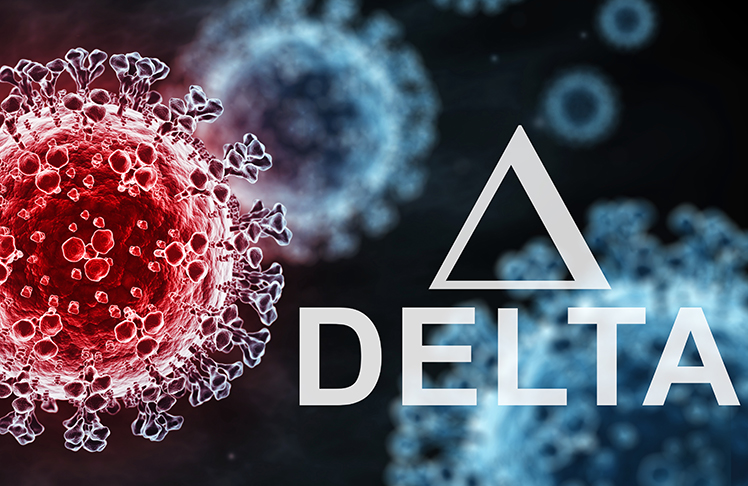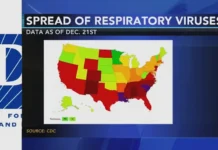
By Aaron Allen, The Seattle Medium
The COVID Delta variant is spreading through the world like wild fire. While some people may take the warnings from health officials as propaganda. The reality is that the Delta variant is more efficient, elusive and in many ways vastly superior to its predecessors.
The ability of this virus to mutate and evolve at an astounding rate is what keeps doctors and researchers up all night, and health care systems at or near capacity.
According to experts, viruses on a genetic level are just like you and me and family genetics. We have parents, siblings and children and with each generation although we are related there are differences – physical differences and physical variants.
The same goes for other biological entities such as viruses. As viruses evolve and multiply, their evolutionary process is similar to that of a family, when a virus mutates or “changes” the next generation of virus can possess abilities that makes them stronger, duplicate faster and potentially more dangerous than its parents.
“Everything changes [with a virus],” says Dr. Mark Del Beccaro, who provides oversight for both the testing and vaccine strategy team at Public Health – Seattle King County. “From just normal genetic changes from generation to generation, what I compare it to is I don’t look exactly like my siblings and I don’t look exactly like my parents and my kids don’t look exactly like me, but you can see a similarity across all of those generations but there is also continued changes over time.”
“What makes viruses different, and the Delta variant is a good example, is their time between generations is measured in hours and days not years,” added Del Beccaro. “They reproduce their next generation very rapidly. As soon as they come into somebody’s body and they manage to overcome the body’s defense system, infect a cell and start replicating their genes, [it is] during that process they will come up with natural mutations and natural changes.”
According to Del Beccaro, due to these changes viruses can randomly make changes that makes them even better at evading our immune systems and gives the virus an advantage to reproduce more rapidly — which is why the Delta variant has the ability to produce more infections at a faster rate than the 2020 virus.
“It is like natural selection of the best virus,” says Del Beccaro. “If a virus creates a variation of their spike protein that is a little bit different that it tricks our immune system enough that it has a better chance getting in a cell and replicating then that new variation will have an advantage over prior examples of that virus.”
When it comes to the Delta variant, the speed of replication is its dominant trait. Scientist are trying to understand the nature of this characteristic, the speed in which the Delta variant reproduces and infects the bodies respiratory system. Some believe it is its ability to deceive the defense system which allows more of the virus to survive and continue inundating the body.
Because of the aggressive nature of the Delta variant and the anti-vax propaganda, the number of people infected has once again placed the nation and the world on high alert. The percent of those infected, particularly in the unvaccinated, is similar to the numbers that were experienced when COVID first appeared.
As the world works to immunize the population, the war’s efforts have switched to what is the best way to message the people on the importance of getting vaccinated?
Because of the growing number of unvaccinated people becoming infected, the virus is putting hospital systems under great strain as the number of beds and ICU beds are dwindling. In addition, the enormous burden placed on the hospitals treating Delta patients has, in many cases, taken away the hospital’s ability to attend to other emergencies and serious illnesses in non-covid patients.
According to hospital sources, hospitals are limiting what they consider elective procedures, and unfortunately procedures categorized as urgent but not super urgent procedures.
“Any time you have a system, any system, hospital systems that are over 90 percent full it becomes a very critical thing because you can’t do normal flow,” say Del Beccaro. “I worked for decades as an emergency room provider and around capacity issues. When you get that full, the simple act of moving a patient from an ER to a bed is not possible because you have to wait for a person to leave a bed, so that person is backing up the ER and we are experiencing that now.”
How important is it that people get the vaccine?
COVID survivors like Tia Shabazz, who experienced the virus in the early stages of 2020 and who has lost loved ones due to the virus, urges people to set aside their hesitancy for the well-being of everyone because she believes that getting protection from the vaccine outweighs the severity of the symptoms.
“This Delta variant is whole new level,” says Shabazz. “Within the last few weeks, I have had several people contact me because they caught COVID and it has been a very hard and traumatic experience for them and when I had COVID it was towards the beginning and they [doctors] didn’t really know to much at that time. From my experience and from what they tell us I feel like being proactive rather than no action.”
“Even though it [the vaccine] does not protect us from COVID it is suppose to minimize the effects if you happen to catch COVID,” continued Shabazz. “And from my situation, I was definitely for vaccinations. I was scared, don’t get me wrong, but from my personal experience it was the lesser of two evils. If it would lesson what I went through last time, then I am all for it.”
Despite the pleas from people like Shabazz, there is still hesitancy among many people when it comes to the vaccine. Antonio Stephens, who experienced the devastating effects of the virus last year as well, is unsure about getting vaccinated, even though he believes that people should take COVID very seriously.
“The first thing I would say about this virus to the people is take it serious, do not downplay this virus,” says Stephens. “Not only did I have family members die from this virus, I contracted it myself and it brought me down, I never felt that sick in my life.”
“I am not sure about the vaccination thing yet, I haven’t done it because there have been different outlooks on it,” added Stephens. “But the vaccine is a personal decision and so I will leave it up to the individual to make that decision for themselves and their families.”
When you talk to health officials, they will all tell you that vaccines have a purpose. That purpose is to mitigate the spread of infectious disease and to minimize the effects, hospitalizations and deaths. While vaccinations are not 100 percent effective, experts agree that without immunizations many human beings, in general, may not live past the age of 10. This is why health officials say that it is important for parents to have their children immunized with several different vaccines to protect them from disease and illness in the future. It is also why booster shots are suggested every five to ten years, and many health care experts believe that COVID will be no exception when it comes to boosters.
“I am not surprised at all that the idea of the booster shot is in conversations,” says Del Beccaro. “Viruses mutate over time. Most of them and the ones that are respiratory-based, like the cold or flu and things like that, are even better at that. Every year we encourage people to get flu vaccine and even the flu vaccine changes year to year to deal with the changes in viruses. So given how viruses change, which lead us to the Delta variant, it is not surprising to me that we would have to get boosters to up our immunity.”
In the bigger scheme of things, as our community and the world continues to fight COVID, the other major factor to success, just as doctors must adapt to the virus ability to change, is that humanity must to learn to trust the science, and to seek advice from someone you trust.
“The concept of somebody you trust is the key to battling hesitancy,” says Del Beccaro. “Part of the influence is finding someone you can trust because they come from a place we feel goes beyond just statistics. The way we talk about things is the way you can change people. It’s not with data but with stories and emotions and the data helps to back that up.”
“600,000 Americans have died from this terrible disease, it is not a joke,” adds Del Beccaro. “But the thing that will mend and to change the minds of some people is when it happens to them or someone they are really close to. So, you don’t worry about something until it is in your face or you don’t miss something or someone until it or they are gone, but if a loved one who was not been vaccinated dies a horrible death that can change people’s attitude.”















